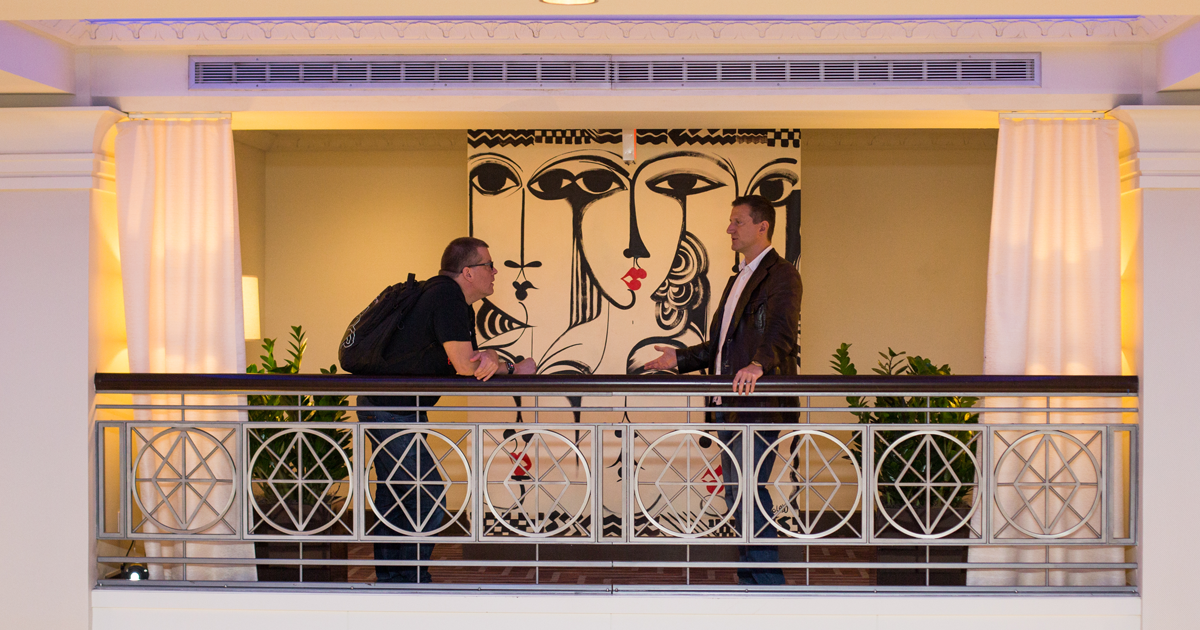Peter and I were in a small plane ascending to the optimum altitude for our skydive over the Atlantic coast. This was the first time I would ever go skydiving and I felt some comfort in that he was a “B” licensed diver with over 400 jumps. We had agreed to do the interview while skydiving and I was beginning to feel increasingly nervous about deciphering the audio afterward when I would go transcribe the interview. This, of course, was dwarfed by my fear of heights as we flattened out at 12,500 feet. My heart was beating out of my chest. I think I started hallucinating because as Peter smiled I imagined a cat sitting on his shoulder …
Ok, so this isn’t how our interview went, but I bet he would have been game if I asked. Let’s get back to reality. I let my imagination go off the rocker there for a second …
I had heard Peter Shankman’s name before, but I didn’t understand the true breadth of his accomplishments until a few months ago when my colleague Kim suggested that I connect with him for an interview. After a bit of fact-finding, I was floored and had to find a way to intersect with him.
Peter is outrageously remarkable … at 500MPH. Yes, that’s faster than normal, and I also found out that he’s friendlier than normal, too. That’s a special combination.
Shankman is best known for being the founder of Help A Reporter Out (HARO); a company that changed the way public relations works. How many people can say they literally changed an industry? If you step back, at his core, Peter is a marketing genius who skydives (yep, that’s true), writes, completes triathlons, and is building his tribe called ‘Shankminds.’
Okay, so you might be exhausted after reading that, but hopefully, you’re as inspired as I was to get the interview going. Without further ado, let’s parachute into that morning in Manhattan when we connected …
[Setting: I showed up at the Lexington Hotel about 20 minutes before our scheduled meeting time and was greeted by my photographer Adeline. She whispered to me that Peter was already there so I quickly scouted out the lobby. Fortunately, one of my best friends Travis is an executive at the hotel and he tipped me off on the best spots to sit. After saying hello to Peter and exchanging pleasantries we went upstairs and sat at a two-top that overlooked the lobby.]
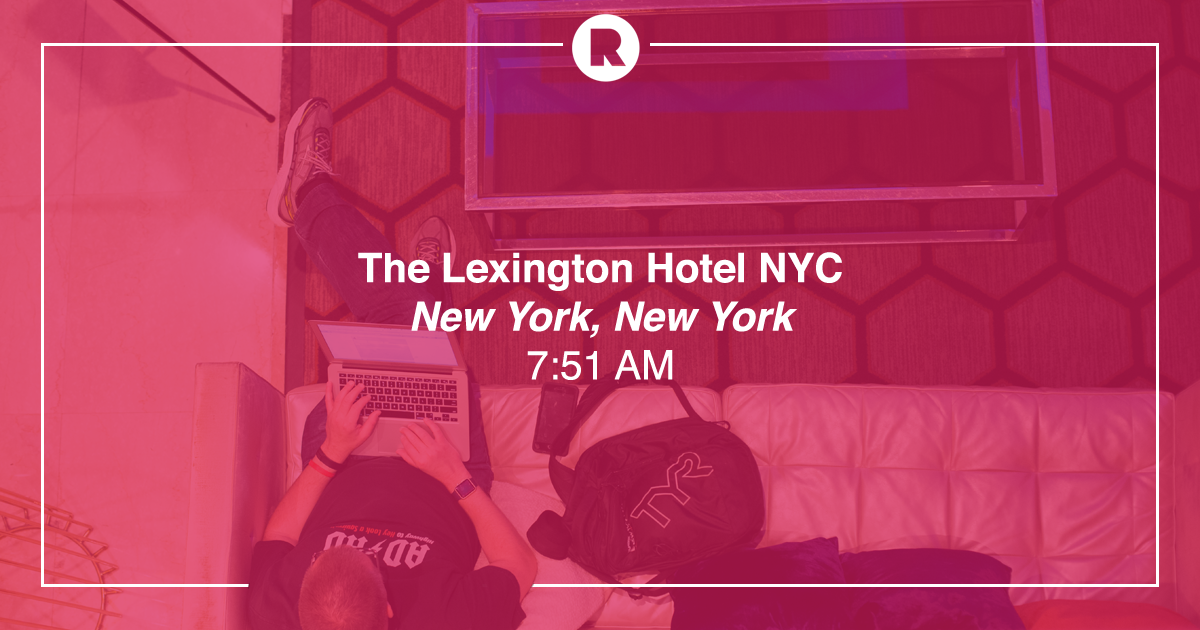
Dean: Peter, United Airlines calls you ‘Lord of the Skies’ … when someone sits next to you on a plane and they’re like, “What do you do?” How do you answer that?
Peter: I tell them that I started a consulting company a couple of years ago and have been very lucky overall. Every day is different, which is fun. At the end of the day, I think I create content. Whether I’m writing, whether I’m speaking, whether I’m interviewing, whether I’m going on TV, working on a new book, writing a blog post, writing for a magazine or an op-ed … I create content. That’s what I do. What that content is varies by the day, but at the end of the day, I like to create things that other people find useful and that benefits the world at large.
Dean: What’s the most fun thing you get to do?
Peter: For me, strangely it’s being on a plane. So, I spend the majority of my time on an airplane, whether I’m giving talks around the world, consulting, working for different companies, whatever it is. I fly about 350,000 miles a year and what’s great about that is that my happy place is on an airplane. That’s where I can truly get into deep work and focus. I have no internet, I have no anything bothering me. I simply sit down and I start working. For me, for someone with massive ADHD, that’s actually great. The big misnomer about ADHD is that we’re bouncing all over the walls and can never sit still, but in actuality, ADHD allows for incredibly focused, deep work if the opportunities present themselves. On an airplane, all I have is that I’m sitting in front of a machine, I’m in front of my computer, and I can write.
Dean: So does an airplane seat have a Pavlov’s Dog effect on you? Like you sit down and your body and mind tells you that it’s writing time?
Peter: My last book, the one that’s out now, called Zombie Loyalists that came out about two years ago, I had six months to write it. I did all of the research in the first month and with two weeks left to write, my editor called and said, “How’s it going?” I said, “Oh, it’s great,” but I hadn’t written anything. Not one word. I hung up the phone and I went to the United Airlines website and I booked a roundtrip ticket to Tokyo leaving the next day, business class. I got on the plane, I sat down, armed with my jacket, laptop, power cord, and headphones, and the plane took off to Tokyo. I wrote chapters 1-5 on the flight out, I landed in Asia, I went through immigration, went outside to take a deep breath of fresh air, came back inside, went back through immigration, went to the lounge, got back into the same plane, same seat, and wrote chapters 6-10 on the flight home. I landed 31 hours later with a bestselling book. I had no other reason to go to Tokyo. Everyone was like, “oh my gosh, you’re insane”. You spent $6,000 to go to Asia for no reason! I said, “no, I spent $6,000 to write a book”. To me, that was the best money spent. I know what I can do and how I can do it given the perfect scenario, so I created the perfect scenario for myself.

Dean: I’m going to switch gears. When I heard about your ADHD I was thinking that this might be the perfect format for Peter so we can kind of jump around. In creating and selling HARO, what’s the biggest entrepreneurial lesson that you learned during those years?
Peter: There were several. I’d say the number one lesson is that very few people actually spend time listening to their audience. Listen to your audience and your audience will tell you what they want and they’ll tell you how to run your business. They will tell you what you should be doing, they will tell you how to do it, they will tell you what you want, what you need to be doing, you just simply need to be listening. And very few companies actually take the time to listen to their audience. That’s what blows my mind. You have this incredible opportunity every day to hear what your customers are saying and to adapt on the fly. Very few people do it. I can never understand why, but for me, adapting on the fly gave me this ridiculously loyal audience that wanted to do my PR for me, wanted to tell me how great HARO was, wanted to share what we were doing, and that when HARO was acquired, lead to a much larger purchase price than I thought it was worth because the people who bought it talked to my users and they said, “Yeah, we love this thing and we use it religiously because it’s so great.” It really sort of built this legendary status around it and all I was doing was really listening.
Dean: I mean, intense loyalty definitely warrants a premium. Is there a public relations story that sticks out in your mind as the most successful?
Peter: There are several of them, but I think a great story for me is that back in 2006, a company working for Aqua Teen Hunger Force, the Cartoon Network show, did a publicity stunt. They set up what looked like little Lite Brites in different cities around the US. Under bridges, in major public areas, they looked like little computerized Lite Brites. The problem is that they also looked ridiculously like bombs and in 2006, we were still a little hyped on that and it shut the city of Boston down, they shut down D.C., all this stuff. My first book, which was all about PR stunts had just come out, and I called all the morning shows and all of the cable networks and I said, “Hey, I have this book. I’m happy to help” and I hit the cycle that day. I wound up talking about PR stunts on CNBC, NBC, CNN, MSNBC. I learned this great lesson that you know, if you give an audience exactly what they want when they want it, they will do your PR for you, and they will love you for it. What amazed me about that was exactly how much press I ended up getting just by being a trusted source. That I think was one of the beginnings of how HARO began and I realized that I had this responsibility to sort of help journalists and help people. At the end of the day, I think that any modicum of success at all, you have a responsibility to send that down. That’s what I did and I got lucky.
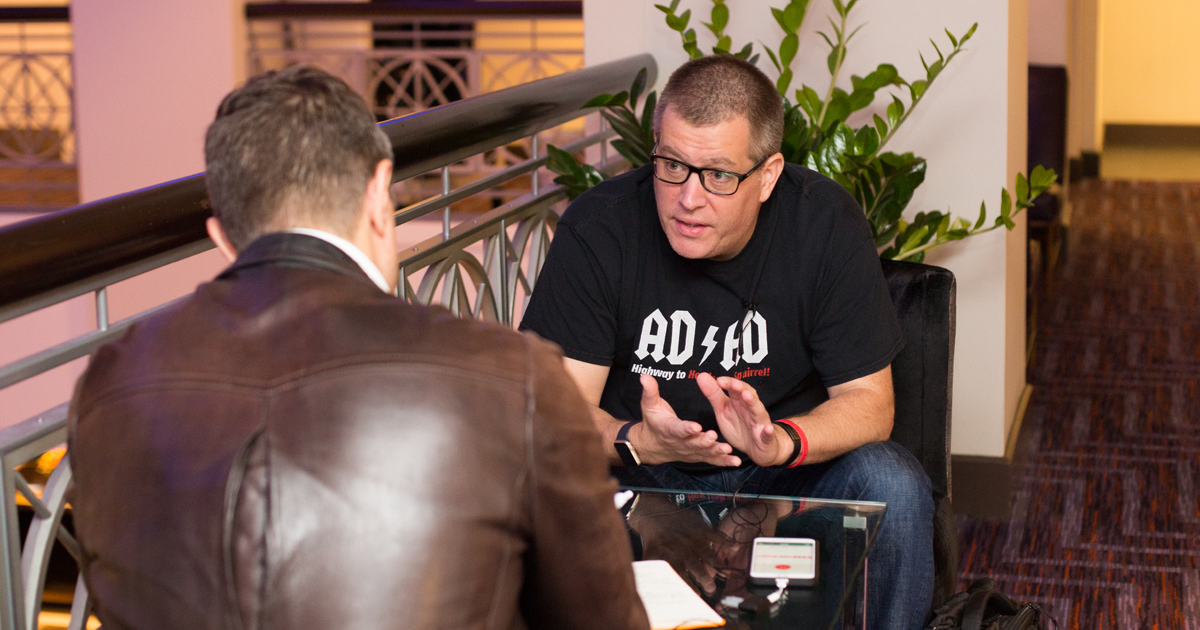
Dean: What is your reaction when you hear that old adage that there’s no such thing as bad publicity?
Peter: There’s terrible publicity. I can give you story after story. I’m pretty sure that Malaysia Air would argue that there’s such a thing as bad press. I’m pretty sure that Paul Ryan in the current political climate would argue that there’s such a thing as bad press. The key is figuring out how to take that bad publicity and show that you’ve learned from it. Show that you’ve improved yourself, your company … The thing about it is is that the public loves nothing more than after they’ve smacked you down, to you raise you back up again once you’ve learned. It’s the problem when you don’t learn that they’ll continue to smack you down. Anthony Weiner is a great example of that. For those not from New York, he was a lock to be the next mayor. This is not up for debate. This is fact. He was going to be the next mayor, all he had to do was not screw it up, and it was very difficult for him. When he was busted for sending out pictures, all he had to do was own it. Go on TV, tell New Yorkers that he was trying to have some sexy time with his wife and he doesn’t know how to use Twitter, my bad. They would have mocked him for eight hours, it’s required by New York City law, the New York Post would have written some pithy headline and life would have gone on. He would have been mayor. Instead, he kept that story alive by denying it and this and that for six weeks until at one point, he said he was hacked. He said that he must have been hacked by the Chinese. I was in the Green room doing the O’Reilly Factor when he announced that and I turned to Geraldo Rivera who was next to me and said, dude, this is bullshit. This guy isn’t important enough to get hacked. No one knew who the hell he was. If he’d just owned that story, he’d be mayor right now. The premise that all PR is good PR is terrible. All PR can be good PR if you know how to use it and you’re smart enough and humble enough to say you know what, I did screw up, but this is how I’m going to fix it.
Dean: So on the flip side of that, something that I talk to my team about often is ‘how do we delight our customers today?’ … is there a company that sticks out in your mind as far as delighting customers consistently that just gets it?
Peter: Well yeah, but first let’s talk about what delighting customers is. We live in a society right now where we expect to be treated like crap. On any specific measure … I’m assuming that you flew here from Florida. How was your flight?
Dean: My JetBlue flight was delayed … otherwise, it was fine, I generally like JetBlue.
Peter: Because you generally like JetBlue, because they’re usually on time because you get the seat that you want, free wifi … You sign what’s called a Contract of Carriage, which says that they will fly you to a certain place at a certain time and they will fly you back and you will pay them. That’s pretty much what they did. They didn’t let you fly the plane, they didn’t have a date waiting for you on the other end, but they did what they said they were going to do and it’s like hey, this is a great airline because they did what you needed them to do. What you expected was that you get to the airport, pick the TSA line with the shortest line, but when you get up there and it’s your turn, you’re getting the anal probe, now you go in that room for an hour and when you come back, they move you from Gate 4 to Gate 457, that’s 4 airports and 6 gates over that way … now you’re running, you get there, but now it’s 20 minutes before the flight takes off and you’ve lost your seat, so your seat was 4A and now it’s 37Bathroom and there’s a line of blue water dripping between your legs … enjoy your flight. By the way, there’s no overhead bin space so you have to check your bag, good luck ever seeing it again. That’s what we expect, so the fact that they simply didn’t suck means you’re thrilled. So you want to delight your customers … I don’t need you to walk across fire, I don’t need you to do all of that Tony Robbins stuff. I just need you to be a little bit better than what I expected, which is crap. I need you to be a little bit better than crap, a couple levels above that bar because the customer service experience is so low that I don’t need you to walk on fire. My favorite joke is that two guys go running and when they’re running in the woods and they see a bear. The first one says, “Holy shit, it’s a bear” and he leans down to tighten his running laces. The second one says, “Dude, don’t be crazy, you can’t outrun a bear,” and the first one says, “No, I just need to outrun you.” Right? So, I don’t need you to be awesome, I just need you to be a little bit better than what I expect.

Dean: [laughs] The bar is just so low …
Peter: It’s so ridiculously low, it’s on the ground. You just have to step over it. To answer your question about companies, everyone knows my story with Morton’s Steakhouse. I tweeted them from the airport and they showed up when I landed with a porterhouse. Here’s the thing though, Morton’s already knows customer service because Morton’s sent a steak to the airport for me, except if you went to Morton’s and your drink was messed up and your steak was cold, you’d be pissed as hell. So, they already know that they’re going to do a great job for you when they show up. They ask you if you’re celebrating when you make a reservation. You say, “Yeah, it’s my wife’s birthday” and they ask her name. When you walk in, there’s a menu there that say happy birthday with your wife’s name on it and she says, “Oh my gosh” and Instagrams the shit out of things. Who are her friends? People like her. Who is she telling this to? She’s telling it to people who want that same experience just like her. So, you don’t have to be awesome. You just have to be a little bit better. Just a little bit.
Dean: If you just do what you say you’re going to do, consistently and without fail …
Peter: Under promise, over deliver, right? I had an editor at America Online, my favorite editor in the world. I learned so much from the guy. His classic go-to line was “be brilliant at the basics.” If you can be brilliant at the basics, you can get through anything.
Dean: Peter, who is the most remarkable person you’ve ever met and why?
Peter: Good question. I am a huge, huge fan of Steve Case. I worked at America Online under Steve Case and he was just brilliant. Lou Lamoriello, former general manager of the New Jersey Devils, I worked under him for a year. He taught me all about keeping your word and doing the things you say you’re going to do, and I took a ton away from him. My parents are pretty awesome. Seth Godin. I learned a lot from him. He didn’t hire me for my first job after America Online and it was great. I stayed friends with him and went out on my own. I’ve been very lucky to meet a lot of interesting, smart people. 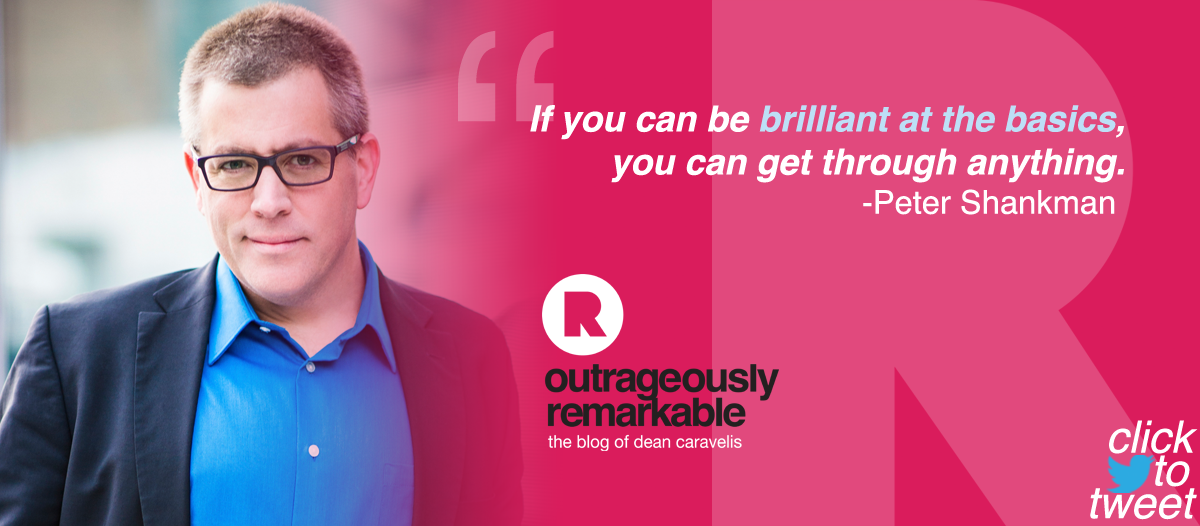
Dean: I actually have a question related to Seth. I saw him a couple of days ago up at Hastings on Hudson for an altMBA gathering we had. So, when I interviewed him a couple of months ago, he emphasized the value of heroes over mentors. Who are your heroes?
Peter: My heroes are anybody who has done something that they’ve been told they couldn’t do and they went out and did it anyway. That goes everywhere from someone like Conor McGregor. Four years ago, that guy was on welfare. If that’s not a story behind great marketing, I don’t know what is. But people who have risen up and proved that they can do things … I did not have a fun childhood. I had great parents, but I was a fat kid in New York City. I had a pretty shitty childhood. A fat kid with ADHD who didn’t know what it was and didn’t know why he kept yelling in the middle of class and not paying attention. Knowing that now, anyone who has really sort of busted their ass to get where they are and not sort of had it handed it to them, I’m a fan of. I think at the end of the day, you should be learning from everyone you meet. If you do that, you’re doing well.
Dean: I completely concur. Whenever I see somebody who I hadn’t seen for a few years and they did something that I just didn’t think was possible … to me, there’s nothing more inspiring.
Peter: I love seeing kids who knew me in junior high school and they say, “Hey, I saw you on the news!” And I’m like, you weren’t very nice to me, but okay, that’s cool.
Dean: [laughs] Peter, what’s something that is totally true about you that most people wouldn’t believe?
Peter: I have complete 100% Imposter syndrome. I wake up every morning sure that today is the day that the New York Times is going to write a cover piece about how full of shit I am. Everyday. It doesn’t happen and I go to bed very thankful and then the next day it starts all over again.
Dean: This conversation about Imposter syndrome is something that I was having a couple of days ago. Pretty much every successful person I’ve met with has it. Are there certain scenarios where it comes up specifically? Does it happen just about every day? How do you deal with it?
Peter: I think in my world, I’ll give a great speech and I’ll have a great experience and I’ll have 10,000 people sharing for me on their feed, and then a month later I’ll be reading the reviews from the audience questionnaires. And if one person out of 10,000 says, “I would have preferred more whatever” or “He spoke too fast.” I’ll immediately forget the 9,999 that said nice things and I’ll think well, that’s it. I totally blew it. Of course, I didn’t, but in my head, it’s over and I might as well quit and go be a farmer. And I’ve gotten better at dealing with it, but Imposter syndrome is a real thing. I think a lot of it is a person that is ADHD like myself, we thrive on the standing ovation. That dopamine, that serotonin, that adrenaline hit. Then when we get a person who didn’t like us, that’s what we focus on, and it takes away from us. It drains us. So I think that for me, that’s where it hits if it does. But you know, I still have a hard time taking compliments. I’ve learned to smile and say thank you. What’s that saying, never join a club that would consider having me as a member. It’s like God, if they consider me a hero, life must be really fucked up. I think as I get older, I try to avoid that and I try to realize that a lot of it is just me stuck inside my own head. It helps.
Dean: We’re connected on social media and I see how active you are. You know, about that 1 person out of the 10,000 that’s going to write the nasty message … how do you deal with trolls? Do you have some kind of internal narrative?
Peter: They used to bug the shit out of me, but I literally do not pay attention anymore. It has taken years of therapy, but I don’t listen to them. It’s not that I don’t listen to my haters. Haters are different. I listen and I see if they have a valid point. If they have a valid point, I try to address it. But there are people out there who literally talk just to hear themselves talk and it’s not worth it. I’d rather do something else with my time. It’s funny because I’ll be sitting there and working … I’m doing another Half Ironman next month in Atlantic City and I know that there will be people there who will finish before me because I’m not a winner. I’m not going to win a Half Ironman. I know my skills and winning one isn’t going to happen, but I will finish though. I’ll finish and I’ll feel awesome. Last year, I finished and I felt awesome and this guy came up to me and said, “Hey, how’s it going?” and I recognized him, he was a guy in the PR industry. And I was like, “Hey man, did you run? I’m super happy that I finished in under seven hours,” and he was like, “I came in 2nd in my age group.” I was like, “Great, that’s awesome,” but I thought to myself, well now I suck. Dude, you don’t suck, you just did a Half Ironman! You completed it and your friends think you’re a beast. You just did this, enjoy it! But in that moment, it’s like wow, he podium’ed. Great. I’m the worst person ever. You have to learn to just roll with it because it’s kind of bullshit.
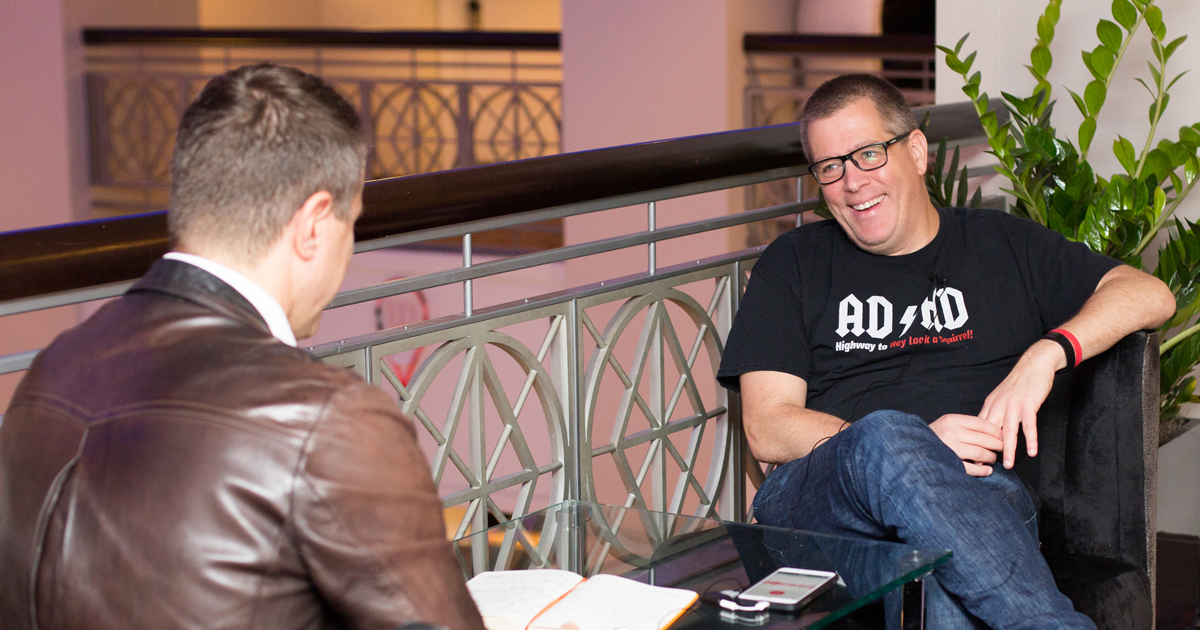
Dean: There’s always one-uppers and humble braggers …
Peter: Of course. At the end of the day, you just learn to ignore that voice inside of your head that says you’re terrible. Look at how other people see you and try to absorb a little bit of that. Don’t do it so much that you get pompous, but try it. It’s great. There’s a great commercial for an animal adoption thing that shows a guy being pulled over by the cops and the cop says, “Sir, do you know how fast you were going? It doesn’t matter how fast you were going because you’re awesome. I think you’re amazing.” The guy doesn’t get a ticket and the cop says, “Can I get your autograph? I can’t believe I get to meet you. This is so great.” The cop walks back to the car and the guy looks over to his dog and the commercial says, “Wouldn’t it be great if everyone in life saw you the way your dog does?” That’s sort of the thing. I know that people want to interview me and I’m like wow … or he must be completely stupid and has no idea who I am. You learn to let that go. I think anyone who is successful has that in their head. Then you try to balance that while still staying humble. I never want to start believing my own press because that’s the kiss of death. The day I sold HARO, I walked back in my apartment and for the first time, I was in the elevator thinking, “Man, I’ve got some money, I’m the shit, I just did this amazing this, look at that!” I walked into my apartment and my cat had puked all over the living room rug. Not just in one spot, but literally all over. The first three hours of being a millionaire, I was on my knees cleaning up cat puke and I like to think that was supposed to happen.
Dean: It was a grounding experience.
Peter: That was the universe saying “good job”, but stay humble. I really believe that’s why it happened.
Dean: Okay Peter, has there been any app or tool that you’ve been using this past year that has fundamentally changed your life?
Peter: I’m a big fan of an app called Quit That! When I quit drinking, for me, having an app that counts the days and shows me my streak makes it real. Quitting something without a defined number or a way to track that isn’t real, at least in my head. So Quit That! has been just spectacular. What else so I rely on … I love Shazam. Shazam is great because I can hear a song in the background and without having to pay attention to it so I don’t break focus. What’s App is great everywhere in the world … Everything that matters the most to me is under my health category. I’ve fallen in love with an exercise bike called Peloton. It’s a spin bike that connects to the Internet via a 22″ screen and you can take live classes on the bike. It’s the greatest thing in the world.
Dean: I know of many people that are building apps and the question that I always have for them is ‘why do we need one more’? Everything has to have a purpose, you know?
Peter: The apps that you can’t live without are the ones that you need and that’s it. I keep everything in folders and I only open them when I need them. I keep a weather app, FaceTIme for my daughter, Facebook, Twitter, email, and that’s it. I don’t think we need more and if we do, they’ll sort of evolve into what we use on a regular basis.
Dean: I have one last question for you. If you can put your humility aside, what is something that people can learn from you on your secret to being outrageously remarkable?
Peter: I have always believed that when you meet someone, the best thing you can do is learn their story as opposed to trying to tell them yours. It’s very easy to try to tell them yours. It’s a lot harder to try and learn theirs, but the benefit of learning theirs is that it’s information that you’re getting. Information that you’re giving to someone else, you haven’t gotten something in exchange, so in letting someone tell you their story, you’re actually getting more information from them and that can benefit you in a million ways, the least of which is that you can connect them to someone else and you’ve done a good deed. I’m like if you’re on a plane next to me, unless you fake your own death, I’m going to know everything about you by the time we land. I just love being able to do that and then put people together and become that connector. I think that’s an underrated skill.
Thank you, Peter. I’m ready to shed my Imposter syndrome and move just a wee bit faster.
A big thank you to Adeline Ramos, owner of You Look Lovely Photography, for her amazing flexibility and stellar work.
Check out Peter Shankman’s website for more about him & to find out more about Shankminds.
Don’t want to miss one of my interviews? Then subscribe to be an insider & don’t miss out!
